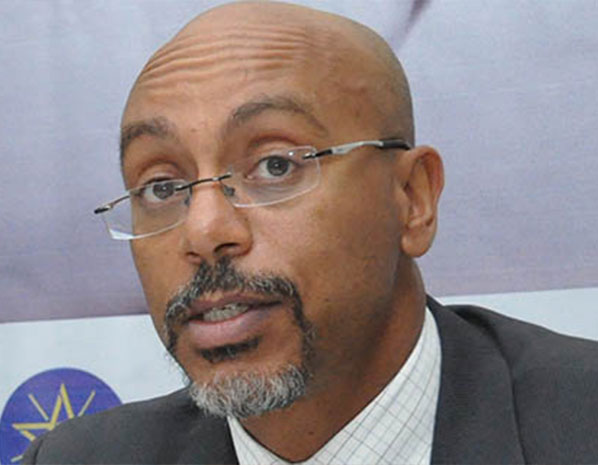
Verbatim | Nov 30,2019
 Khalid Bomba
Khalid Bomba The founding head of the Agricultural Transformation Agency (ATA) has resigned from office on January 8, 2021. Khalid Bomba believes it is time to move on, allowing leadership to transition to a local team.
Accepting his resignation, Oumer Hussein, the minister of Agriculture, appointed Yifru Tafesse (PhD), the senior director at the Agency in charge of the CEO Office, as acting CEO.
A Western-educated returnee, Khalid departed last week after serving the Agency for a decade. Before joining the Agency, he was working as a senior programme officer for agricultural development at the Bill & Melinda Gates Foundation, one of the major financial supporters of the ATA.
Khalid studied economics and political science at Swarthmore College in the United States and received his post-graduate studies in development and programme management from the London School of Economics & Political Science as well the University of Oxford, respectively.
He also served as Africa director for the Global e-Schools & Communities Initiative.
"I resigned as part of the Agency's organisational strategy, which aimed at transitioning international staff to a local team," said Khalid.
The Agency, which was established in 2010 with the hope of promoting agricultural sector transformation, has been operating with a staff of well-paid, Western-educated and diasporic employees. It was formed during the late Meles Zenawi's premiership and directly reported to the Office of the Prime Minister.
"I was supposed to leave in July at the end of the GTP II," he told Fortune. "But I extended my departure by six months to help the team finalise the 10-Year strategy with the Ministry of Agriculture."
During its establishment, critics were citing overlapping responsibilities with an existing federal agency, the Ethiopian Institute of Agricultural Research. There was also sharp criticism toward the government suggesting it was better to strengthen the Institute than to form a new entity. This was in addition to tensions with the Ministry of Agriculture, which was under the stewardship of Tefera Deribew.
Headquartered in Addis Abeba, the Agency has offices in Amhara, Tigray, Oromia & Southern Nations, Nationalities & People's regional states and operates with 400 employees. Even though it is a federal agency, it is partially funded by nonprofit organisations, including the Bill & Melinda Gates Foundation and the Danish International Development Agency.
A few weeks ago, the FAO released an evaluation report on the ATA’s investments and interventions over an eight-year period. The report stated that the Agency played a significant role in raising the GDP by an average of 0.3pc a year. It also asserted that the ATA had contributed 1.7 billion dollars to the GDP and registered returns roughly 10 times its expenditures of around 140 million dollars.
More than 280,000 individuals were lifted out of poverty, with around 74pc of those coming from rural areas, according to the FAO, which highlights that due to the ATA's interventions and projects, 11,000 jobs were created in the period between 2013 and 2019.
"We built an organisation that can continue to deliver in the future as well," Khalid said.
During its lifespan, the Agency has developed over 250 different strategies, including one on malt barley, and implemented 48 projects including its flagship programme on soil mapping, explained Khalid, mentioning his major achievements.
Khalid remarked that he would have liked to work further in emerging regional states such as Somali, Afar, Gambela, Benishangul and Harar with his team; work on livestock development and helping regional agricultural bureaus build their capacity.
"I wish my successor to focus on these areas as well as in the areas with food insecurity," he said.
The acting CEO, Yifru, had served as managing partner and CEO of Adroit Consultancy & Training Services Plc and in different senior positions in other companies, including NAS Foods, Summit Beverages, Nyala Insurance and the Ethiopian Management Institute. He has also worked at the University of South Africa, as a lecturer in the Faculty of Business & Economics at Addis Abeba University, the Addis Abeba School of Commerce and Meqelle University.
Khalid was the first person to arrive and the last person to leave the office, according to Mahlet Mezemir, who worked with Khalid for eight years, during five of which she served as an executive assistant to the CEO. She joined the Agency as an administrative assistant, but she was promoted to an executive assistant after successfully accomplishing tasks assigned to her by Khalid.
He was determined, she said, and knows the agricultural sector very well, even though many believed his diaspora background was a disadvantage.
Mahlet remembers the time she got to study in an undergraduate programme while she was working with him. She says that he was supportive and made her attend her classes.
"After I finished my classes," Mahlet said, "He said I was overqualified for that post and promoted me."
Two years ago, Mahlet left the Agency to join an international research institute as a consultant.
"What I am now is a yield on the capacity-building and opportunities I got from him," he said.
PUBLISHED ON
[ VOL
, NO
]

Verbatim | Nov 30,2019

Sponsored Contents | Oct 08,2020

Exclusive Interviews | Apr 22,2022

Fortune News | Jun 13,2025

Fortune News | Jan 12,2019

View From Arada | Mar 27,2021

Fortune News | Oct 05,2019

View From Arada | Nov 02,2024

Radar | Jul 17,2022

Radar | Oct 12,2019

Dec 22 , 2024 . By TIZITA SHEWAFERAW
Charged with transforming colossal state-owned enterprises into modern and competitiv...

Aug 18 , 2024 . By AKSAH ITALO
Although predictable Yonas Zerihun's job in the ride-hailing service is not immune to...

Jul 28 , 2024 . By TIZITA SHEWAFERAW
Unhabitual, perhaps too many, Samuel Gebreyohannes, 38, used to occasionally enjoy a couple of beers at breakfast. However, he recently swit...

Jul 13 , 2024 . By AKSAH ITALO
Investors who rely on tractors, trucks, and field vehicles for commuting, transporting commodities, and f...

Oct 4 , 2025
Eyob Tekalegn (PhD) had been in the Governor's chair for only weeks when, on Septembe...

Sep 27 , 2025
Four years into an experiment with “shock therapy” in education, the national moo...

Sep 20 , 2025
Getachew Reda's return to the national stage was always going to stir attention. Once...

Sep 13 , 2025
At its launch in Nairobi two years ago, the Africa Climate Summit was billed as the f...